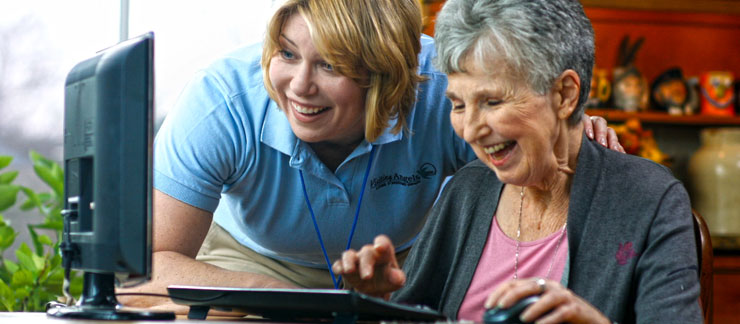
Coordinating Family and Professional Care
When someone you love has dementia, coordinating professional care is rarely easy. Your loved one may be nervous, uncomfortable, or even resentful of a non-family caregiver. As your loved one’s primary caregiver, it’s likely you’ll share some of these concerns.
Quality home care providers know the importance of coordinating care and developing a trusting relationship between a professional caregiver, a care recipient, and the family caregiver.
After more than 20 years of working as dementia care professionals, we’ve learned a few important lessons.
Early Conversation and Comfort are Essential
While there are times when professional care is urgently needed, families are often considering their options. Family caregivers may have questions or concerns about in-home care. Make sure potential care providers take the time to learn about your needs and lay a foundation for care.
Have face-to-face conversations before caregiving begins. As a family caregiver, the benefits of an early, in-person conversation/consultation will help you better understand how a potential caregiver will care for your loved one.
It may be difficult initially for non-family caregivers and care recipients to feel comfortable with one another. To overcome this, we recommend including the family caregiver during the first few visits. Try to use this time to foster a familiar, safe, and comfortable environment for your loved one and the professional caregiver.
Create a Schedule that Works
When coordinating care, scheduling is an important issue. Discuss and agree early on how the scheduling will be handled. Ensure that your loved one will receive the care he or she needs when care is needed — even in an emergency.
Get answers to the following scheduling issues:
- What are the professional caregiver’s regular work hours?
- What kind of notice will I receive if there’s a change in schedule?
- What kind of notice do you need from me if I need to change the schedule?
- How flexible are you about rescheduling?
- Are you available on request for non-scheduled sessions?
- What contingency plans are in place in case of emergency?
Having a mutual understanding of these issues will make coordinating care easier. Agree on terms to reduce misunderstandings and conflict later on.
If you are hiring a care agency, many of these concerns are easily managed through the agency’s administrative team. But asking these types of questions helps you to have a clear understanding of how changes in your schedule or the caregiver’s will be handled. The inevitable bumps in the road will be less stressful.
Clear Lines of Communication
It is important to establish open communications early on between family caregivers and professional care staff. The smallest details will make a big difference in the quality of care your loved one receives. Be sure you make the professional caregiver aware of the important details.
In the beginning, when coordinating care, take five to ten minutes at the start and end of each care session to talk with your loved one’s care provider. Treat this as an essential responsibility. Practice doing this for the first month of care, so that communication between you and the professional care provider becomes a habit.
Coordinating professional in-home care does not need to be stressful. Take steps in advance to identify issues and agree on the terms to ensure your loved one’s safety and comfort. When you feel comfortable and confident, you’ll be more successful working with in-home care services.
